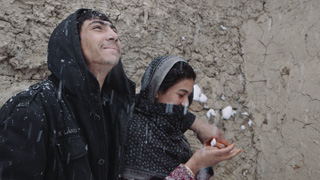Three Songs for Benazir
 AFGHANISTAN / 2021 / Pashto, Dari / Color / Digital File / 22 min
AFGHANISTAN / 2021 / Pashto, Dari / Color / Digital File / 22 min
Directors, Producers: Gulistan Mirzaei, Elizabeth Mirzaei
Photography: Elizabeth Mirzaei
Editing: Melanie Annan, Christoph Wermke
Sound: Gulistan Mirzaei
Music: Qais Essar
Produced by: Omar Mullick, Jamil Rezaei, Homayoun Shamaal
Source: Mirzaei Films www.threesongsforbenazir.com
A young couple who live in a camp for internally displaced persons in Kabul, Afghanistan. The young Shaista sings for his beloved wife Benazir. They live together happily, as if the whole world was theirs alone. However, a suspicious blimp floats ominously in the skies overhead, reminding us that they are being monitored, their daily lives under domination. Shaista dreams of being the first in his tribe to enlist in the Afghan Army but his family opposes his aspirations, for fear of Taliban retribution. We see him next four years later, facing the consequences of the path he was forced to choose in protecting both Benazir and their newborn. Despite it all, Shaista continues to sing of his unfailing love for Benazir.
[Director’s Statement] This passion project has haunted my professional and waking life for years, a small film distilling all the large ideas of love into the unlikely frames of Shaista and Benazir, Afghan teens in a Kabul displacement camp. You may feel you have seen these faces before—this garb, landscape, dust—usually framed in the language of war and news. But I am from here. And I have tried to rip out the tired, hollowed out—yes even obsolete—grammar for this world. My world. And through cinema, now our world. See what love looks like when bottled in the young, who have little in the world, but worlds in their hearts. That, I thought, was a film worth making. My own bloodlines run through this land and even further to Iran, where we were displaced. On the edge of my life, on the frame of this world, was a father lost to a Russian landmine—my fast track to adulthood, like Shaista. Dreams big enough to involve the madness and possibility of films. Dogged pursuits over five years of filming this story to that end. Seeing a world mirrored on the other side of the camera that I might recognize and you probably wouldn’t. A world of heart, not statistics, a world of dreams, drive, pushed on for a girl. Not only a world of men. And not a world of bombs. But—in the end—quietly, defiantly, on the lips of a boy, a world of song.


Gulistan Mirzaei was born in Afghanistan, growing up as a refugee in Iran. Assisted the Editor-in-Chief of Kabul Weekly, the first independent newspaper to be published in Kabul after the Taliban’s departure. Mentored by award-winning director Siddiq Barmak (Osama, 2003). Elizabeth Mirzaei lived in Kabul for over eight years. A Film Independent Fellow and a Sundance Institute Advisor. Her cinematography has been featured in films screened at Venice and Toronto Film Festivals, among others. Now lives in California. Their first film, Laila at the Bridge (2018), received the IDFA Bertha Fund, screened at Locarno and Edinburgh, and won awards at numerous festivals including CPH:DOX, Bergen, and Santa Barbara.
